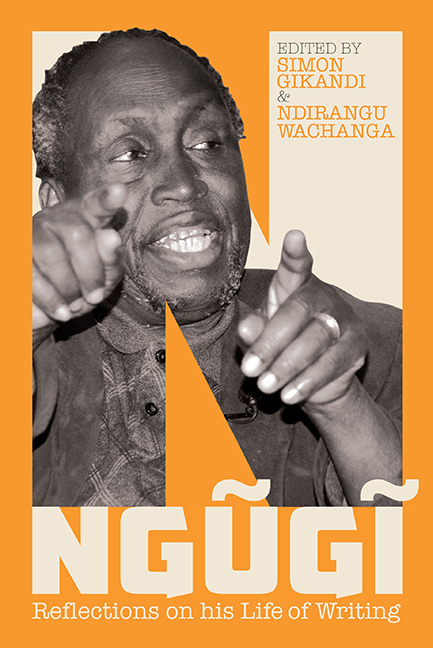Book contents
- Frontmatter
- Contents
- Preface
- Acknowledgements
- Chronology
- Photographic Section
- Introduction: Ngũgĩ wa Thiong'o: Reflections on His Life of Writing
- Ngũgĩ at Work
- Part I Serenades & Beginnings
- Part II Memories, Recollections & Tributes
- 10 Remembering Early Conversations with Ngũgĩ
- 11 Ngũgĩ wa Thiong'o at 80: Pongezi (Congratulations!)
- 12 Ngũgĩ wa Thiong'o at 80: Inspiring Encounters
- 13 Ngũgĩ in the 1970s at the University of Nairobi
- 14 ‘Professor, You are in Ngũgĩ's Book’
- 15 Mũraata, Mũrutani, na Mũthikĩrĩria (Friend, Teacher & Listener)
- 16 Fear & Trepidation in Asmara: Meeting Ngũgĩ
- 17 Ngũgĩ wa Thiong'o: A True Story
- 18 Ngũgĩ wa Thiong'o: Tribute on His 80th Birthday
- Part III Working with Ngũgĩ
- Part IV The Writer, the Critic & the World
- Part V The Other Ngũgĩ
- Appendixes
- References
- Bibliography of Ngũgĩ's Primary Works
- Works Cited
- Notes on Contributors
- Index
10 - Remembering Early Conversations with Ngũgĩ
from Part II - Memories, Recollections & Tributes
Published online by Cambridge University Press: 27 July 2019
- Frontmatter
- Contents
- Preface
- Acknowledgements
- Chronology
- Photographic Section
- Introduction: Ngũgĩ wa Thiong'o: Reflections on His Life of Writing
- Ngũgĩ at Work
- Part I Serenades & Beginnings
- Part II Memories, Recollections & Tributes
- 10 Remembering Early Conversations with Ngũgĩ
- 11 Ngũgĩ wa Thiong'o at 80: Pongezi (Congratulations!)
- 12 Ngũgĩ wa Thiong'o at 80: Inspiring Encounters
- 13 Ngũgĩ in the 1970s at the University of Nairobi
- 14 ‘Professor, You are in Ngũgĩ's Book’
- 15 Mũraata, Mũrutani, na Mũthikĩrĩria (Friend, Teacher & Listener)
- 16 Fear & Trepidation in Asmara: Meeting Ngũgĩ
- 17 Ngũgĩ wa Thiong'o: A True Story
- 18 Ngũgĩ wa Thiong'o: Tribute on His 80th Birthday
- Part III Working with Ngũgĩ
- Part IV The Writer, the Critic & the World
- Part V The Other Ngũgĩ
- Appendixes
- References
- Bibliography of Ngũgĩ's Primary Works
- Works Cited
- Notes on Contributors
- Index
Summary
James Ngũgĩ (Ngũgĩ wa Thiong'o) was the first African writer I ever met. This happened some time in 1962, while he was still an undergraduate at Makerere University College but was already contributing a fairly regular weekly or fortnightly column for Nairobi's Sunday Nation entitled ‘As I See It’, which was meant to represent an African point of view of Kenyan affairs, just as a parallel column under the same title by N. S. Toofan was intended to provide a voice for Kenya's Asians. Ngũgĩ had earlier published a few short stories in Penpoint, a campus literary magazine, as well as in the Kenya Weekly News, and he had completed the first draft of a longer story he called ‘The Black Hermit’, which he entered in a novel-writing competition sponsored by the East African Literature Bureau, but at the time I met him he was known primarily as a journalist.
I was then teaching English and History at a boys’ boarding school in Kisii, Western Kenya in a program called Teachers for East Africa, which had been set up by the U.S. Government to supply American teachers to East African secondary schools in need of qualified instructors. Those of us in the first wave of this program had had a six-week orientation at Makerere before going out to our schools, but I did not chance to meet Ngũgĩ at the university. It was only after some months of reading his newspaper commentary that I decided to seek him out on one of my trips to Nairobi. I found him at the Nation office, and we went off to have a chat at a hotel bar nearby.
I cannot recall everything we talked about, but much of it may have concerned local topics he had written about in the paper: education, politics, history, language (especially the importance of Kiswahili), women's issues, etc. We also discussed some of the new writing that was emerging in parts of Western and Southern Africa. I had started reading African novels, plays, and poetry while at Makerere, and I was curious to learn about his own literary education and the opinions he had formed of Western and African authors whose works he had read and studied.
- Type
- Chapter
- Information
- NgugiReflections on his Life of Writing, pp. 63 - 65Publisher: Boydell & BrewerPrint publication year: 2018

